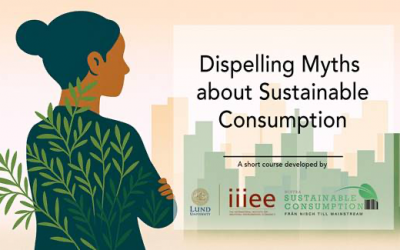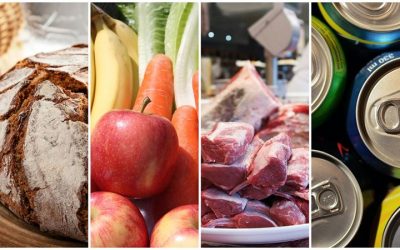Mistra Sustainable Consumption was a research programme that ran from 2018 to 2025 and has now concluded. The website will not be updated after March 2026.
As well as providing energy, it is also good if the food we eat is tasty, nutritious, affordable and easily accessible. Neither should it cause unnecessary environmental impact, either globally or at the place where food is produced and processed, and food should be produced in such a way that farmers and factory workers are not harmed, for example by being exposed to toxic pesticides.
Although food has been subject to question since the 1970s for its impact on resources and the environment, it still accounts for significant emissions, of greenhouse gases for example, the greater part of which are due to meat and dairy consumption. The environmental impact of food consumption also arises from land use, eutrophication, water consumption and the effects of toxic substances. This in turn affects biodiversity, human health and the availability of clean water.
Over the years, many analyses have been performed that show great differences in environmental impact between different food products. This means that there is already considerable knowledge of what the problems are and what changes could make eating more sustainable. Calculations show, for example, that almost all plant-based products have a lower environmental impact than meat and milk (animal-based products), with the exception of some of what is grown in greenhouses and food transported by air. One change towards sustainable eating is thus to reduce the consumption of animal-based products. Today there are plant-based alternatives to both meat and dairy products. Vegan diets have the lowest greenhouse gas emissions, as well as the lowest land and water use.
Another change towards sustainable eating is to reduce food waste. One third of all food produced is lost or discarded and becomes waste. This means that a great deal of food that could have been eaten is thrown away and thus causes a completely unnecessary environmental impact . Reducing waste would mean that we would not need to produce as much food.
There are also other ways of eating that could be sustainable. Buying locally produced food can be a way of supporting local producers and increasing the proportion of local food production, which has been declining since the 1990s to the point that we are now importing half of the food we eat. Buying and eating organically can contribute to an increase in biodiversity, because organic farming uses less pesticide than conventional farming. Buying and eating fair trade labelled products can lead to growers having better conditions. However, it is not certain that all sustainability aspects benefit from eating in a certain way, and it is, as stated, part of Mistra Sustainable Consumption’s research to understand what it would mean if a certain type of eating were to become more common.
This text has mainly been taken from our report “Eating sustainably”. Read it here.
Latest news about food
Discuss sustainable consumption with a new chatbot!
In connection with the final conference of Mistra Sustainable Consumption, a chatbot on sustainable consumption is being launched. It is based on hundreds of scientific articles and reports written by researchers within the programme. With the bot Greenchat, you can...
Free Online Course Tackles Myths About Sustainable Consumption
A new online course focuses on the most common myths about sustainable consumption. The course is free of charge and open to everyone worldwide. The course is offered as a MOOC, Massive Open Online Course, making it open to all, regardless of background, location or...
A food tax shift could save lives – without a price hike in the average shopping basket
Photo collage: 1.Pexels, 2.Pixabay, 3.Pixabay, 4.Wikimedia Commons More expensive steak, cheaper tomatoes, but the same total cost for the average basket of groceries at the supermarket. A comprehensive study, led by researchers from Chalmers University of Technology...
See PhD defense “Mainstreaming Sustainable Consumption – Practices, Perspectives, and the Case of Food”
Image: Cover of thesis and Vishal Parekh. Welcome to Vishal Parekh’s PhD defense "Mainstreaming Sustainable Consumption – Practices, Perspectives, and the Case of Food" at Friday, September 26th. The thesis aims to explore the potential roles and perspectives of...
New Book: The Climate Debate Need new Framing to Reach More People
Photo: Manchester University Press Have you ever felt annoyed when someone proudly posts on social media how environmentally friendly they are by avoiding flights, recycling or eating only vegetarian food, even though you share the same values? How we frame...
Join the World’s Largest Conference on Sustainable Consumption
TIm Jackson, Lunds university and Matthias Lehner to the right. Photo: Kenneth Ruona The SCORAI Europe Conference 2025 is possibly the world’s largest gathering focused on sustainable consumption. In 2025, the conference will take place in Lund, Sweden, and the...
Lowering VAT on Food Could Increase Acceptance of a Meat Tax
Despite the climate and health benefits of taxing red and processed meat, such a tax lacks widespread support among the public and policymakers. However, a new study shows that acceptance increases when the tax is offset by lowering VAT on other food items. Red and...
Responsibility Beyond the Individual – A Summary of Four Years of Research
From efficiency to sufficiency: a new article summarizes the results from the first four years of Mistra Sustainable Consumption. The research program Mistra Sustainable Consumption is now in its eighth year. A recent article summarizes the findings from the program’s...
The whole world took notice of her research on men’s emissions
https://www.youtube.com/watch?v=kaBBdU-pjPA&t=1s Watch the story about the viral article on men's emissions above. In July 2021, Mistra Sustainable Consumption published a scientific study on how individuals’ climate emissions could be reduced by 40%. This became...
New Report: These Policies Could Reduce Nordic Emissions
In a new report personally delivered to the Swedish Climate Minister Romina Pourmokthari (L) today, researchers examine which policy measures are most effective in reducing consumption-based greenhouse gas emissions in the Nordic countries. The researchers focused on...
Publications about food
2025
Understanding opposition: arguments for and against a meat tax in Sweden and their effect on policy attitudes Journal Article
In: Environmental Research: Food Systems, 2025.
Mainstreaming Sustainable Consumption: Practices, Perspectives, and the Case of Food PhD Thesis
2025, ISBN: 978-91-8106-345-5.
Book of Abstracts: SCORAI Europe Conference 2025 Proceedings
2025, ISBN: 978-91-8104-559-8.
Årsrapport 2024 Periodical
2025, visited: 02.04.2025.
Social acceptans för klimatpolitik - vad säger forskningen? Book Chapter
In: 2025.
Matskatteväxling – en god idé? Effekter och acceptans av att använda skatter och subventioner för en mer hälsosam och hållbar livsmedelskonsumtion Technical Report
2025, ISBN: 978-91-88041-61-6.
2024
Public and political acceptability of a food tax shift – An experiment with policy framing and revenue use Journal Article
In: Food Policy, vol. 130, 2024.
Mainstreaming sustainable consumption: lessons learned from a four-year research program Journal Article
In: Sustainability: Science, Practice and Policy, vol. 20, iss. 1, 2024.
Årsrapport 2023 Periodical
2024, visited: 28.03.2024.
2023
Acceptance of Low-Carbon School Meals with and without Information—A Controlled Intervention Study Journal Article
In: Journal of Consumer Policy, 2023.
2022
Nudging green food: The effects of a hedonic cue, menu position, a warm-glow cue, and a descriptive norm. Journal Article
In: Journal of Consumer Behaviour, vol. 1–12, 2022.
Återanvändning är rätt väg för förpackningar Miscellaneous
2022.
Sustainable consumption through policy intervention—A review of research themes Journal Article
In: Frontiers in Sustainability, 2022.
Potentials and consequences of altered consumption practices Technical Report
2022, ISBN: 978-91-8040-178-4.
62 sätt att möjliggöra hållbar konsumtion Technical Report
2022, ISBN: 978-91-8040-202-6.
Årsrapport 2021 Periodical
2022.
Consumption-based Scenarios for Sweden - a basis for discussing new climate targets Technical Report
2022, ISBN: 978-91-88041-40-1.
Taking sustainable eating practices from niche to mainstream: the perspectives of Swedish food-provisioning actors on barriers and potentials Journal Article
In: Sustainability: Science, Practice and Policy, vol. 18, iss. 1, 2022.
2021
Växtbaserad dryck som mainstream? - fördelar, nackdelar, hinder och möjligheter Technical Report
2021, ISBN: 978-91-8040-093-0.
Konsumtionsbaserade scenarier för Sverige - underlag för diskussioner om nya klimatmål Technical Report
2021, ISBN: 978-91-88041-36-4.
Shifting expenditure on food, holidays, and furnishings could lower greenhouse gas emissions by almost 40% Journal Article
In: Journal of Industrial Ecology, 2021.
Potential health impact of increasing adoption of sustainable dietary practices in Sweden Journal Article
In: BMC Public Health, vol. 21, no. 1332, 2021.
Årsrapport 2020 Periodical
2021, visited: 03.05.2021.
Policy Options for Sustainable Food Consumption - Review and Recommendations for Sweden Technical Report
2021, ISBN: 978-91-7873-787-1.
The practice approach in practice: Lessons for Civil Society Organizations (CSOs) that Work Towards Sustainable Food Consumption in Sweden Journal Article
In: Sustainable Production and Consumption, vol. 26, pp. 480-492, 2021.
2020
Styrmedel för hållbar matkonsumtion – en kunskapsöversikt och vägar framåt Technical Report
2020, ISBN: 978-91-576-9767-7.
Årsrapport 2019 Periodical
2020, visited: 30.03.2020.
Sufficiency Business Strategies in the Food Industry—The Case of Oatly Journal Article
In: Sustainability, 2020.
2019
Att äta hållbart? En kartläggning av vad hållbar matkonsumtion kan innebära Technical Report
2019, ISBN: 978-91-7873-129-9.
Consumption-stage food waste reduction interventions – What works and how to design better interventions Journal Article
In: Food Policy, vol. 83, pp. 7-27, 2019.
2018
Rädda maten Åtgärder för svinnminskande beteendeförändringar hos konsument Technical Report
2018, ISBN: 978-91-7729-652-2.















